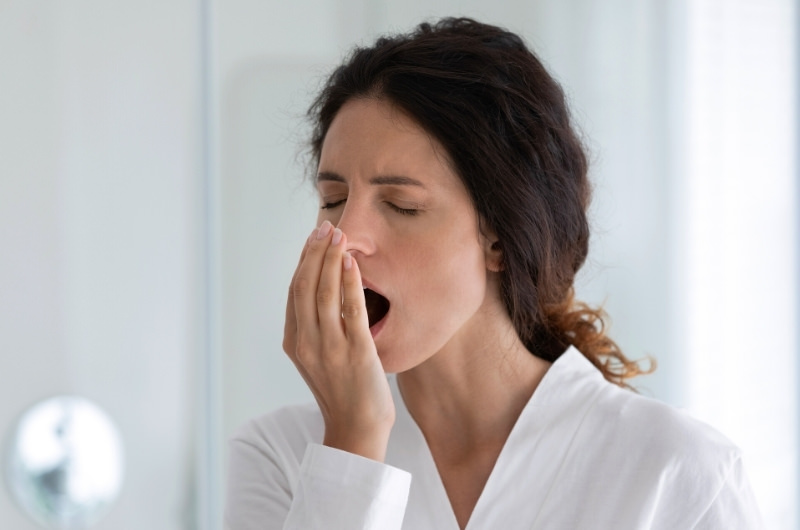A common culprit of having a hot breath is fever. An increasing body temperature signals that your body is initiating an immune response to fight an infection from viruses, bacteria, fungi, etc. The hot breath may also indicate other underlying health conditions such as respiratory diseases, anxiety and stress, dehydration, and hormonal changes. But it can also be your normal body sensation, especially in a hot place. Poor oral hygiene leads to dry mouth, may cause bad breath, and make your breath feel warmer than usual.
When you face your palm on your mouth or nose and breathe out, you may feel the warm air you exhaled. It is normal because your body is alive and releases heat. There are also times when you might feel you’re breathing out cold air.
However, you may notice that your breath is hotter when your surroundings are cold. It’s because your body temperature is higher than your environment.
Sometimes, breathing hot air is a sign of an underlying disease. That could be right!
What causes hot breath?
1. Fever
There are a lot of factors that cause a fever.
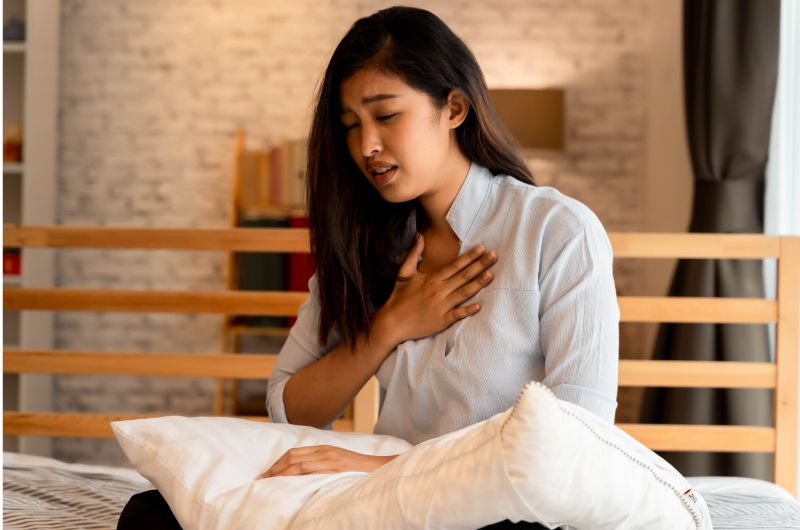
If you’re breathing hot air, but the thermometer doesn’t show any rise in your temperature, you are experiencing an “internal” fever.
It shows similar symptoms to a normal or common fever, but when you ask someone to touch your forehead or palms, they won’t feel you hot, or the thermometer will stay at 36° to 37 °C.
The following are symptoms of a common fever:
- Feeling lethargic
- A feeling of discomfort/uneasiness (malaise)
- Headache
- Lightheadedness
- Chills or shivers
- Cold sweats
- Feeling hot inside
Fever or an “internal” fever occurs when your immune system fights infection from viruses, fungi, bacteria, or parasites.
It may also indicate other underlying health conditions. So, when your internal system is hot, the air you breathe out may also be hot.
Sometimes, an “internal” fever may be due to:
- Stress
- Anxiety
- Period (in women)
- Fatigue from heavy or overexercising
Your fever will eventually disappear once your immune system has completely fought off any infections.
Most people need medications like antibiotics or treatments done at the hospital.
Make sure to visit your doctor if symptoms persist.
In the case of an “internal” fever, you should:
- Have a good rest
- Take a warm bath
- Drink lots of fluid
If necessary, only take medications given by your doctor, especially when you experience the following:
- Sudden rise in your temperature
- Loss of stamina
- Vomiting
- Diarrhea
- Pain or sore throat
- Coughing
- Bleeding through the nose, anus, or vagina
If the thermometer shows a rise in your temperature over time, check it regularly and take over-the-counter drugs to lower it.
If it continues to increase to 40°C, seek medical help immediately, as this may indicate a severe infection or other complications in your body.
2. Respiratory diseases
Sinusitis and allergic rhinitis
Sinusitis occurs when a virus or bacteria causes irritation and inflammation in your sinuses.
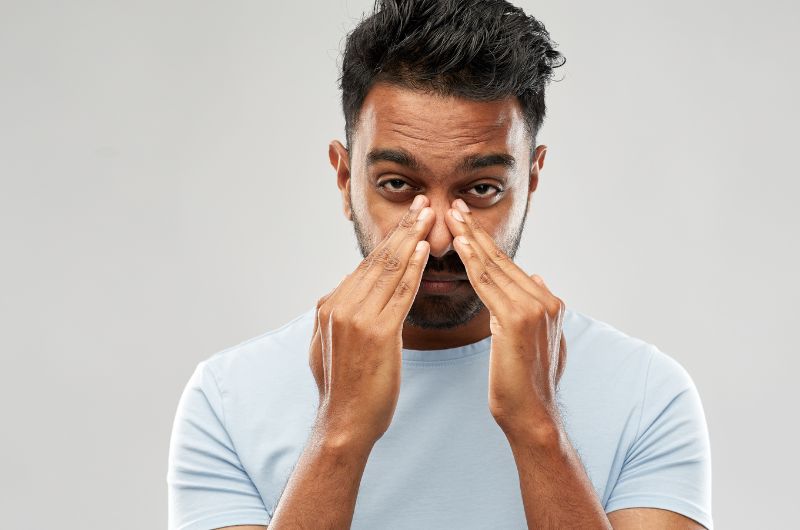
Allergic rhinitis happens when you inhale allergens like pollen, dust mites, and pet dander.
Both may cause a rise in your temperature (fever), runny or stuffy nose, headache, and nasal congestion.
Please visit your doctor to get a proper diagnosis and treatment.
You can manage symptoms of allergic rhinitis through the following:
- Antihistamine or nasal sprays
- Avoiding the allergens
- Keeping your environment dust or pollen-free
- Staying away from your fur pets (just until necessary)
Your doctor may also treat your sinusitis through the following:
- Antibiotics to treat a bacterial infection
- Nasal spray decongestant to reduce the inflammation from a viral infection
Asthma
Asthma is a long-term chronic lung condition when the tubes that carry air in and out of your lungs become inflamed and narrow. It makes it difficult for air to flow through easily, causing difficulty breathing.
During an asthma attack, you may experience breathing rapidly to make up for the restricted airflow. As a result, you will exhale warmer air.
The inflammation of your airways can also cause a feeling of warmth when breathing.
Consult with your doctor to receive a proper diagnosis and accurate treatment plan.
3. Gastroesophageal issues
Silent reflux
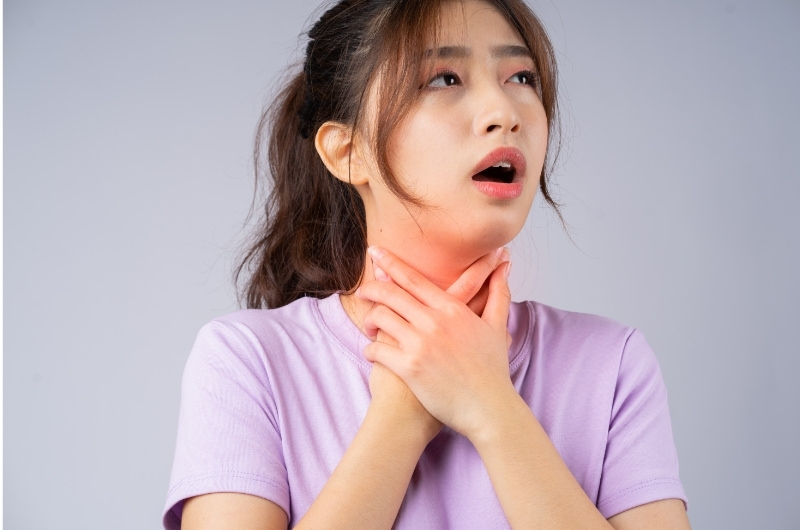
Silent reflux or laryngopharyngeal reflux (LPR) occurs when the acids in your stomach flow back into your esophagus, enter your throat (pharynx), and, lastly, into your voice box (larynx).
At first, it doesn’t present any symptoms, unlike gastroesophageal reflux disease (GERD).
However, as time passes, symptoms may arise, such as:
- A burning feeling at the back of your mouth or in your throat
- A bitter taste in your throat
- Hoarseness and sore throat
- Excessive throat clearing
- Trouble breathing or swallowing
- Asthma
- The feeling of something dripping from your nose into your throat
If your hot breath comes with the symptoms mentioned above, it could be due to silent reflux.
Your doctor may prescribe medicines that will stop or reduce the acids your stomach produces.
A few diet and lifestyle changes may also help you treat silent reflux:
- Exercise and eat a healthy balanced diet
- Eat slowly or have smaller meals
- Do not lie down immediately after eating
- Avoid drinking acidic or alcoholic beverages
- Quit smoking (if you were)
- Elevate your head at least 2-4 inches when lying down
Gastroesophageal reflux disease (GERD)
On the other hand, gastroesophageal reflux disease (GERD) presents symptoms such as discomfort in your chest, heartburn, excessive burping or hiccupping, and bad breath.
Consult your doctor to know if your hot breath is caused by either two of these conditions.
4. Anxiety or stress
Yes, you read that right! Your hot breath could be due to anxiety or stress.

When you’re stressed or anxious, The hormones in your body initiate the “fight-or-flight response.” It causes increased heart rate, rapid breathing or shortness of breath, nervousness, and suffocation.
It may also happen that you’ll feel really hot and need more air, thus causing rapid or heavy breathing.
As you take in more air and breathe it out, you’re releasing heat from your body. Then, it attempts to calm and bring your temperature down.
Below are ways you can relieve stress and anxiety:
- Go travel
- Take a walk
- Do yoga or meditate
- Read a book
- Talk to a friend
- Do the things you love that give you relaxation
- A sip of hot tea might also help
- Allow yourself to sleep at least 6-8 hours at night
Don’t hesitate to talk with your healthcare provider if your symptoms persist. It might be hard for you but think about improving in time.
You may need to undergo psychotherapy and receive medications.
5. Dehydration
Dehydration doesn’t necessarily cause hot breath.
But, when your body doesn’t get enough fluids, it can lead to symptoms such as dry mouth, increased heart rate, and rapid breathing which cause your breath to feel hotter than it usually is.
Dehydration also causes the body difficulty getting rid of excess glucose, causing your blood sugar levels to spike. It may lead to a severe complication called diabetic ketoacidosis (DKA).
One symptom of DKA is deep, slow, and gasping breathing (Kussmaul respiration). It results in a hot breath.
Below are ways to help you keep hydrated and prevent dehydration:
- Drink at least 8 glasses of water or more throughout the day.
- Avoid sugary drinks.
- Limit alcoholic and caffeinated drinks.
- When exercising or sweating heavily, drink more fluids, especially electrolyte-rich drinks.
- Eat hydrating fruits and vegetables.
- Increase fluid intake when exposed to hot places.
- Stay cool and use a humidifier when staying in dry indoor places.
Consult your doctor if you show signs of dehydration to prevent further complications.
Your fluid intake depends on age, physical activity level, overall health, and the climate.
Listen to your body’s thirst signals and drink water regularly to prevent dehydration.
6. Dry mouth
When your mouth doesn’t produce enough saliva to maintain oral health, keep away bacteria, and wash away food particles, it results in dryness, discomfort, and bad breath (halitosis).
Halitosis can be felt as hot or unpleasantly warm.
A dry mouth can result from various factors, including dehydration, side effects of medications, and underlying health issue.
You must drink lots of fluids, stay cool using a humidifier, practice good oral hygiene, avoid tobacco and alcohol, limit caffeinated and sugary drinks, and consult your dentist regularly.
These tips may be for temporary relief. You should seek help from your doctor to address an underlying health issue immediately.
7. Hormonal changes
During pregnancy or menopause, women undergo a shift of hormonal levels which causes various changes in the body.
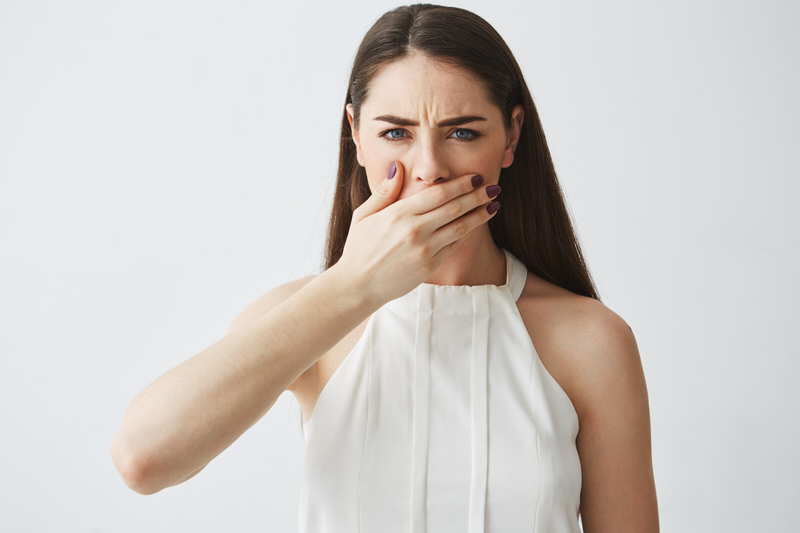
These changes can affect oral health, resulting in gum inflammation, bleeding, and dry mouth.
When you don’t maintain oral hygiene during these times, you will encourage bacterial growth in your mouth, resulting in bad and hot breath.
FAQs
1. Does hot breath mean I have lung cancer?
Researchers of the European Respiratory Society (ERS) International Congress performed an experiment to test if breath temperatures can be a signal for lung cancer.
Higher breath temperatures have been proven to indicate airway inflammation and the formation of new blood vessels that may supply the growth of cancer cells in the lungs.
The results showed that 96% of the population with breath temperatures over 34°C have lung cancer.
However, the researchers want to do further research and tests as there may be other factors affecting the higher breath temperatures in people.
2. Does hot breath mean I have COVID?
Having a breath may not be a specific indicator of covid infection. It may indicate other respiratory conditions such as pneumonia, asthma, sinusitis, etc.
Watch out for the following common covid symptoms including:
– Fever
– Cough
– Shortness of breath
– Fatigue
– Muscle ache
– Headache
– Sore throat
– Loss of taste or smell
– Diarrhea
– Blocked or runny nose
If you experience the following symptoms, you must stay home and contact a healthcare provider to get tested for covid infections, such as COVID-19.
References
- https://www.medicalnewstoday.com/articles/why-do-i-feel-hot-but-no-fever#checking-for-fever
- https://www.medscape.com/viewarticle/831396
- https://www.tuasaude.com/en/internal-fever/
- https://www.mayoclinic.org/diseases-conditions/dry-mouth/symptoms-causes/syc-20356048
- https://www.healthline.com/health/kussmaul-breathing
- https://www.healthline.com/health/bad-breath
- https://www.nhs.uk/conditions/covid-19/covid-19-symptoms-and-what-to-do/
- https://www.webmd.com/covid/covid-19-symptoms

